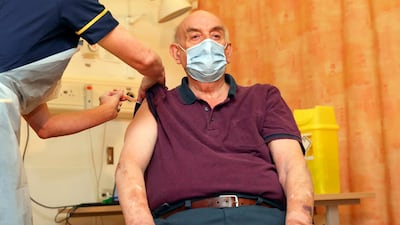Britain has stepped up the race to inoculate its population against coronavirus as the first patients are injected with the Oxford University/AstraZeneca vaccine.
Dialysis patient Brian Pinker, 82, became the first person in the world to be injected with the shot, which was administered by the chief nurse at Oxford University Hospital. Father of three Trevor Cowlett, 88, and Oxford Vaccine Group head Prof Andrew Pollard were next in line.
Mr Pinker said he was so pleased to be getting the vaccine and that he can “now really look forward to celebrating my 48th wedding anniversary with my wife Shirley later this year".
This gallery shows his vaccination and other shots of the UK gearing up to start rolling out the vaccine.
The distribution of the “game-changer” vaccine comes, however, as the threat of a third national lockdown to contain a faster spreading strain of the virus looms.
Prime Minister Boris Johnson, who will chair the government's Covid-O committee on coronavirus restrictions on Monday, said there was "no question" tougher measures were on the way.
Asked what further restrictions would be put in place, Mr Johnson said: "What we have been waiting for is to see the impact of the tier four measures on the virus and it is a bit unclear, still, at the moment.
"But if you look at the numbers, there is no question that we are going to have to take tougher measures and we will be announcing those in due course."
Prof Pollard said "we are at the point of being overwhelmed by this disease".
Health Secretary Matt Hancock said a lockdown that included school closures and the shutting the vaccine was a "saving grace" but "we have some very difficult days ahead".
Former health secretary Jeremy Hunt said a new lockdown that included school and border closures was needed "straight away" as the pressures on the health system were "off-the-scale worse" than previous winter crises.
Most primary schools reopened across the country on Monday but many were expected to defy a government order and remain shut.
'Difficult days ahead' warns Matt Hancock
On Sunday, 54,990 positive tests and 454 deaths were recorded.
According to the latest data, one in four people tested for the Covid-19 in London are infected with the virus. A test positivity rate of 26.8 per cent was recorded on December 29, up from 15.7 per cent on December 22.
Mr Hancock said Monday’s rollout of the Oxford/AstraZeneca vaccine was a “pivotal moment” in the UK’s ability to curb infections and ultimately allow the straitjacket of lockdowns to be removed.
"The saving grace is that we have a vaccine. The vaccine is the way out, but between here and now we have some very difficult days ahead," he told BBC's Radio 4 Today programme.
A key scientific advisor, Sir John Bell, also warned there warned there was a "big question mark" over whether vaccines would work on the South African variant of the virus.
"I am incredibly worried about the South African variant," Mr Hancock said.
Six hospitals in England will administer the first of around 530,000 Oxford/AstraZeneca doses Britain has ready.
The programme will be expanded to hundreds of other British sites in the coming days, and the government hopes it will deliver tens of millions of doses within months.
Last month, Britain became the first country to use a different vaccine produced by Pfizer and BioNTech, which has to be stored at ultra-low temperatures. So far, about one million people have been injected with the Pfizer/BioNTech shot in the UK.
The Oxford/AstraZeneca vaccine is cheaper and can be stored at fridge temperature, which makes it easier to transport and use.
Coronavirus cases in the UK have risen sharply in recent weeks, fuelled by the new, more transmissible variant.
Dr Michael Tildesley, a modelling expert who advises the government’s Sage group, said the speed at which the new strain was spreading could mean a suite of new restrictions will need to be introduced.
“Even if you closed schools that might not be enough to bring the R number below 1,” he told the BBC.
Mr Johnson said on Sunday that tougher restrictions were likely to be introduced, even with millions of citizens already living under the strictest tier of rules.
Asked whether the government was considering imposing a new national lockdown, Mr Hancock said: "We don't rule anything out."
He added that people needed to stick to the rules for new restrictions to have an impact.
"It is down to people's behaviour, frankly. What matters is, yes of course, the rules that we put in place, but it is also about how people act," the health secretary told Sky News.
"And frankly what I would say is this: it is critical that everybody in the country does all that they can to reduce the spread of the virus."
________________________________________________










